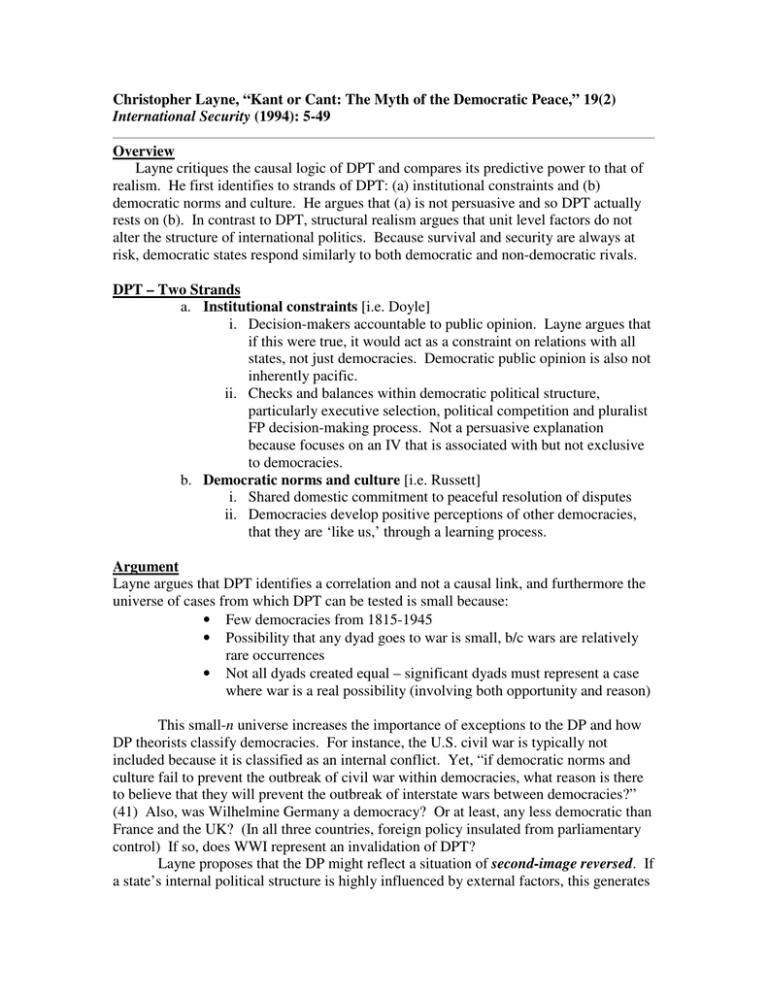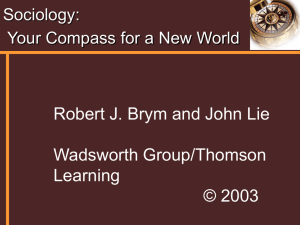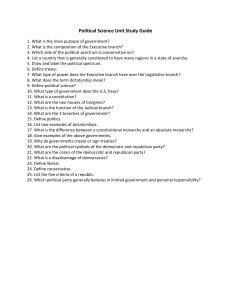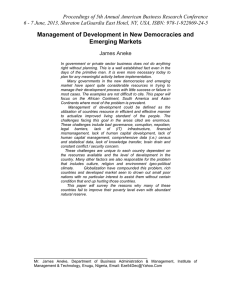Christopher Layne, “Kant or Cant: The Myth of the Democratic... Overview International Security
advertisement

Christopher Layne, “Kant or Cant: The Myth of the Democratic Peace,” 19(2) International Security (1994): 5-49 Overview Layne critiques the causal logic of DPT and compares its predictive power to that of realism. He first identifies to strands of DPT: (a) institutional constraints and (b) democratic norms and culture. He argues that (a) is not persuasive and so DPT actually rests on (b). In contrast to DPT, structural realism argues that unit level factors do not alter the structure of international politics. Because survival and security are always at risk, democratic states respond similarly to both democratic and non-democratic rivals. DPT – Two Strands a. Institutional constraints [i.e. Doyle] i. Decision-makers accountable to public opinion. Layne argues that if this were true, it would act as a constraint on relations with all states, not just democracies. Democratic public opinion is also not inherently pacific. ii. Checks and balances within democratic political structure, particularly executive selection, political competition and pluralist FP decision-making process. Not a persuasive explanation because focuses on an IV that is associated with but not exclusive to democracies. b. Democratic norms and culture [i.e. Russett] i. Shared domestic commitment to peaceful resolution of disputes ii. Democracies develop positive perceptions of other democracies, that they are ‘like us,’ through a learning process. Argument Layne argues that DPT identifies a correlation and not a causal link, and furthermore the universe of cases from which DPT can be tested is small because: • Few democracies from 1815-1945 • Possibility that any dyad goes to war is small, b/c wars are relatively rare occurrences • Not all dyads created equal – significant dyads must represent a case where war is a real possibility (involving both opportunity and reason) This small-n universe increases the importance of exceptions to the DP and how DP theorists classify democracies. For instance, the U.S. civil war is typically not included because it is classified as an internal conflict. Yet, “if democratic norms and culture fail to prevent the outbreak of civil war within democracies, what reason is there to believe that they will prevent the outbreak of interstate wars between democracies?” (41) Also, was Wilhelmine Germany a democracy? Or at least, any less democratic than France and the UK? (In all three countries, foreign policy insulated from parliamentary control) If so, does WWI represent an invalidation of DPT? Layne proposes that the DP might reflect a situation of second-image reversed. If a state’s internal political structure is highly influenced by external factors, this generates a selection process determining which states become democracies and which don’t. Greater external security facilitates a more democratic political structure and a lower propensity/need to fight. Lastly, Layne argues that the belief in a democratic zone of peace has dangerous consequences for U.S. foreign policy. “Because it links American security to the nature of other states’ internal political systems, DPT’s logic inevitably pushes the U.S. to adopt an interventionist strategic posture.” (46) This is dangerous because liberal IR theory is based on hope not fact. Empirics [Read only if interested] Layne undertakes an empirical test of four ‘near misses’ (democracies almost went to war) to assess relative explanatory power of DPT and realism. Employs a process-tracing approach. These represent easy cases for DPT because the effect of democratic norms should have been reinforced by economic interdependence or ‘special’ relationships between disputants. • Indicators of DPT:1 i. Public opinion should be strongly pacific ii. Policymakers should refrain from making threats or preparations for threatening activity against other democracies iii. Democracies should go to great lengths to accommodate each other in crises. • Indicators of realism: i. Ratio of national interest to democratic respect – the more vital the issue at stake, the more likely FP shaped by realist imperatives rather than democratic norms. [how does one assess this?] ii. Leaders should be attentive to strategic concerns and relative distribution of military capabilities. iii. Broader geopolitical considerations should account significantly for crisis outcome. • Cases The Trent Affair – U.S. and UK (1861) American arrest of two Brits on a UK ship triggered aggressive reaction by British public and hard-line policy by government (diplomatic demand, military preparations and embargoes). Additionally, “British policymakers believed that England’s resolve, credibility, and reputation were at stake internationally.” (18) Despite strong pro-war opinion in Northern states, the Lincoln administration submitted to British demands b/c could not afford a simultaneous war with the UK and the Confederacy. France also supported British demands, and American officials were well aware of the pro-war sentiment of British public. Strategic considerations, not democratic culture/norms, explain why war was avoided. 1 These are weakly developed. While he derives the effect of norms/culture through presence of certain behavior, it is not quite clear why this behavior necessarily follows from constraining effect of democratic norms – is this really what we should expect to see? Venezuela crisis – U.S. and UK (1895-6) U.S. intervened diplomatically in Anglo-Venezuelan border dispute to assert regional hegemony in Western hemisphere. UK rejected American demands. Both sides recognized real possibility of war and the dispute escalated. Then in 1896, UK changed its position, resulting in peace settlement of dispute. This was due to strategic considerations, i.e. UK constrained from going to war by an unfavorable BOP with US and by a deteriorating international situation (no allies). Both sides did consider war as a legitimate component of their diplomatic strategy. No evidence that public opinion affected policy in either country. The Fashoda Crisis – France and UK (1898) Anglo-French dispute over control of Egypt/Upper Nile. In response to French advance on Fashoda, London re-conquered Khartoum, Sudan. Troops met in Fashoda, provoking a diplomatic crisis. The dispute was really about “relative status of France and Britain as Powers.” French foreign minister realized that France constrained by domestic political situation (Dreyfuss affair) and could not accept diplomatic defeat, so pleaded with UK for a face-saving compromise. However, UK refused to give Paris an alternative to either humiliating withdrawal or war, b/c it had become a matter of reputation. British hard-line diplomacy was supported by bellicose domestic public opinion. France eventually had to accept diplomatic defeat b/c of its relative military inferiority. The Ruhr Crisis – France and Germany (1923) France invaded Ruhr in response to Germany’s attempts to reduce its reparations obligations under the Versailles system. Also repeated French rejection of ‘second image’ arguments that her security would be enhanced if Germany transformed into a democracy – what mattered was Germany’s latent power, not her domestic political structure. Germany resisted occupation, though this dispute did not result in war because Germany was militarily weak.







